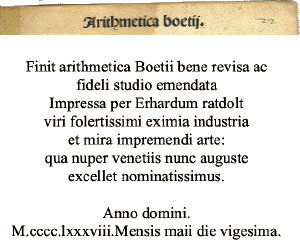
Philosopher, writer and statesman; b. 470 - 475? (Rome?), d. 524 (Pavia?).
Many stories have been woven from Boëthius' life; even his given names are controversial, and his surname is often written Boëtius. The only trustworthy information comes from Boëthius' own writings.
Boëthius, a Catholic Christian, was the son of the Roman consul Flavius Manlius Boëthius. He spent his boyhood in Rome during the reign of Odoacer. His father died while he was still young. He was taken into the household of a senator and married his daughter Rusticiana. In 510 he became consul himself, now under the reign of Theodoric, with whom he developed a close friendship.
In 520 Boëthius was appointed magister officiorum (Head of Government and Court Services). Two years later his two sons became consuls, too, and their convoy from their house to the Senate was greeted by an ovation of the people, much to Boëthius' delight. It was the day when Boëthius delivered an eulogy on Theodoric, which established his name as an orator of excellence.
Boëthius was a man with an unwavering sense of justice. On one occasion, when a famine had broken out due to bad harvest and an edict had been issued that all corn had to be sold to the government to satisfy the needs of the Ostrogoth army, Boëthius intervened and had the case taken to the king. Theodoric reverted the edict, and the countryside was spared from the worst effect of the famine.
Through these and other actions Boëthius made himself powerful enemies. In 518 the Catholic Justin I had become Eastern Roman emperor in Constantinople and started a wave of persecution of Arian Christians. Theodoric was an Arian Christian, and several Christians in Rome developed secret contacts with Justin. Boëthius' enemies accused him of being part of the conspiracy. Boëthius strongly denied the charge, but he was detained in Padua under the Senate's orders and executed in 524. Later sources report that the Senate acted under duress, that Theodoric soon regretted his decision, and that his death was hastened by his remorse.
Boëthius' contemporaries held him in the highest regard as a scholar of outstanding intellect. Among his early works were textbooks for high school use on geometry, astronomy, arithmetic and music, the latter two based on Greek handbooks of Nicomachus of Gerasa in Syria, who worked around 100 AD. Before 510 Boëthius had began his challenging project of translating the complete works of Aristotle and Plato into Latin.
During the period of his incarceration Boëthius wrote De consolatione philosophiae, a very personal account of the consolation derived from philosophical reflection. In a dialogue between Philosophy, personified as a woman, and Boëthius himself the prisoner is shown how the Platonic notion of a Highest Good that controls the universe can be upheld in the face of apparent injustice. The work does not address Christianity at all, but its ideas can be accommodated in the Christian doctrine.
De consolatione philosophiae is generally regarded as Boëthius' greatest work and was definitely the most influential of all his writings. Versions of it appeared before the end of the 15th century in German, French, Italian, Spanish and Greek. Chaucer translated it into English prose before the year 1382. It is said that, after the invention of printing, amongst others Queen Elizabeth translated it, and that the work was well known to Shakespeare.
Boëthius' translations of Greek philosophical works contributed to their survival into medieval times. When Cassiodorus, one of Boëthius' senatorial colleagues, founded a monastery, its library contained Boëthius' works as the basic stock for the education of its monks.

Part of the front cover and text of impressum from a 1488 edition of Boëtius' Arithmetica printed by Erhard Ratdolt.
Sibley Music Library, Ruth T. Watanabe Special Collections, University of Rochester, New York.